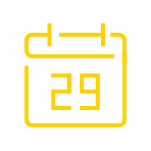About your BA (Hons) Early Childhood Studies degree
Our BA (Hons) Early Childhood Studies is ideal if you're passionate about helping to shape the future of young children. The course will give you an understanding of how young children develop and learn, and give you the skills, knowledge and confidence to progress your career in a variety of roles within early years settings. You'll study online giving you the flexibility to develop your career around your other commitments and your work placement will give you valuable hands-on experience.
Course highlights
- Ranked 7th in the country by the Guardian League Table 2024
- Opens up a variety of career options within the early childhood sector
- Work placement gives you practical hands-on experience in early childhood settings
- You'll complete the Early Childhood Graduate Practitioner Competencies (ECGPC) - a professionally recognised framework that’ll enhance your employability and provide some clarity for your prospective employers as to the graduate level of your achievements
How you'll study
This course is studied 100% onlineCourse length
Study the course over 3 years
Start your course in September
Application deadline
Our next deadline is 30th April 2024
Fees: £15,900
UK Quality Assured
Meet Early Childhood Studies student Jessica
Jessica, a Nursery Nurse from Essex chose our Early Childhood Studies BA (Hons) degree to help develop her career, gain a promotion and achieve her full potential in the Early Years sector. Distance learning allows her to study flexibly so she can balance life as a new mum.

Watch Jessica's story
Course overview
Working with young children can be hugely rewarding and a great deal of fun but it can also be very challenging. Our BA (Hons) Early Childhood Studies degree will help you develop the practical skills, knowledge and qualities needed to deliver a high standard of professional practice in the workplace and open up a variety of career options within the early childhood sector.
Our modules have been designed to develop your understanding of professional and inclusive practice, supporting both the child and the family. You’ll cover a variety of key topics including the roles of parents and other key persons on young children's development, the impacts of lifestyle factors such as activity levels, diet and health, how a child’s environment influences growth and development, organisational policies and practices, as well as exploring child welfare issues such as protection and safeguarding. You’ll be introduced to existing theory and essential research skills relating to children, highlighting the importance of linking theory to your practice. You’ll also focus on your own personal development helping you to reflect on your own working practices and approaches, and identifying opportunities for further learning and skill enhancement. At the end of the course you’ll have the opportunity to undertake a major project on a topic that addresses significant questions relating to your work and/or your specific area of interest.
It is a mandatory requirement to take a practical placement as part of this course. If you are already working in an Early Years (0-8 years) setting then this can be incorporated into your work, otherwise you will need to secure a placement. It’s a great chance to get hands-on experience in early years and education.
Throughout your studies you will complete the Early Childhood Graduate Practitioner competencies. This qualification will make you workplace ready with the Early Years Foundation Stage (EYFS) when you graduate.
You'll also have the opportunity to join our online research groups and other online education events.
If you have already completed a foundation degree (or equivalent), we also offer this course as a one-year top-up degree.
Our advisers will be happy to answer any questions you have about the BA (Hons) Early Childhood Studies degree, studying online or any other aspect of distance learning.
Modules
Due to the structure of this course, there will be instances where you will study two modules simultaneously during a trimester. You will be supported by your tutors to help manage your workload and assessment deadlines.
Please contact one of our advisers to discuss the pacing of this course and the options available to match your circumstances.
Learning and Development
This module introduces you to your own learning as well as children’s and links to existing theory. Explore the difference between learning and development and consider the influence of adults on children’s learning. The key topics will be: human development, understanding learning, study skills and the roles of parents and key persons.
Play, Health and Well-being
The link between lifestyle factors such as activity levels, diet and health is becoming increasingly clear, and greater importance is being placed on the need for children to access outdoor environments. It is crucial to get children making choices and enjoying a healthy balanced diet and active lifestyle from as young an age as possible. Play is recognised as being crucial to children's physical, mental, social and emotional well-being, yet opportunities and encouragement for free play are becoming increasingly limited. You’ll consider children’s well-being and how it relates to their rights. You’ll learn how well-being can be supported through healthy eating, regular physical activity and a play based environment. The key topics will be: well-being, healthy eating and exercise, outdoor play and forest schools.
Researching Childhood
You’ll be introduced to essential research skills relating to children and learn about the importance of linking theory to your practice. The aim is for you to develop skills in child observation and apply general research methods to childhood studies. You'll be expected to work in small groups and share your experience and ideas with your class. The key topics will be: research methods, ethics involved in working with children, types of observation and studying children.
Early Years Practice and Pedagogy
This module will explore the growth and development of children in interaction with their environment and consider the implications for practice. You will observe a child for one semester to consolidate your understanding of the principles of child development. You will then use these insights to analyse how the characteristics of the individual and features of his / her environment interact to influence growth and development in early years; the value of early years and the role of early years practitioner in promoting the learning and development of children.
Children's Rights
This module is based upon a critical exploration of children's rights with the focus on rights to education, protection, human rights and participation. The legal position of children has been enhanced by the United Nations Convention on the Rights of the Child (UNCRC) 1989 to encompass principles of protection, provision of services and participation. However, not all children's lives are the same and it is important that students of early childhood develop a broader perspective by using evidence from international and national contexts. Successful completion of this module will be relevant to students' future employment in voluntary and statutory agencies working with young children. Successful completion of this module will be relevant to your' future employment in voluntary and statutory agencies working with young children.
Embracing Diversity
In this module, you'll discuss disability, differences and special educational needs in relation to debates on inclusion and exclusion, needs and rights, and the importance of seeing every child as an individual. You’ll explore different cultural practices to enable an empathetic understanding of how to help all children feel welcome in a setting. Theories for this module are drawn from different backgrounds such as psychology, sociology and education. The key topics will be: history and language of inclusion, cultural differences and EAL, family structures and lifestyles, policy and legislation as well as special educational needs.
Safeguarding Children
In this module you’ll explore children’s welfare and well-being. You’ll learn about the complexities attached to the notion of risk, child abuse, protection and safeguarding. This module will offer a comprehensive cover of English legislation, policy and procedures for keeping children safe from abuse. You will gain an understanding of the range of provision available to support children’s needs. The key topics will be: child protection, support and intervention, policy and legislation, multi-disciplinary working and welfare and well-being.
Supporting Children's Learning
This module is about the ways in which children play and learn and the means by which adults can mediate and support their experience. You’ll discuss pedagogic strategies and learn about the importance of creative practices and children learning through play. Different early years’ curricula (Steiner Waldorf, Montessori method, Experiential Education, High Scope, Reggio Emilia and Te Whariki) will be compared and contrasted with England’s curriculum. The key topics will be: early years’ curricula, learning through play, creative learning and pedagogy as well as documenting care and learning.
Early Years Practice, Policy and Professionalism
This module aims to develop your understanding of children's learning and development in the context of organisational policies and practices. You’ll be asked to choose a policy and its related practice in your placement setting and study its implications on the role of an early years’ practitioner. You’ll also be expected to participate in the day-to-day running of the setting while undertaking the tasks relating to this module.
Early Childhood Leadership and Management
Building on the principle that good quality in early years provision requires creative and effective leaders who are able to manage resources and foster effective team development, you’ll examine the context in which education and care is provided to review issues of how we can work better to meet the needs of young children. The issues concerning provision in terms of quality and providing equality of opportunity for all children will be explored from philosophical and theoretical leadership perspectives in early childhood. We’ll provide an opportunity to critically review the application of theory to practice to further your understanding of leadership and management in an early childhood context. Your learning will be linked to the Early Childhood Graduate Practitioner Competencies at Level 6.
Interdisciplinary Perspectives
This module will give you an overview of childhood from a range of different perspectives: geographical, historical, philosophical, psychological, sociological, educational and economic. It links concepts from different disciplines to contextualise childhood and update your knowledge of the subject at the end of the course. The key topics will be: how notions of childhood vary across time and place, philosophies and constructs of childhood, the psychosocial interface and the social, political and economic world.
Leading Change in Early Childhood Contexts
Together we’ll explore how to deal with complex change, with a focus on desired outcomes. You’ll examine how education and care is provided, to review issues of how we can better meet the needs of young children in leading change in an early childhood context. We’ll look at working in partnerships and interdisciplinary working, and the challenges that these can present. Fostering your self-development, you’ll evaluate your professional growth and reflect on your experiences.
Early Childhood Graduate Competencies
To help you meet the Early Childhood Graduate Practitioner Competencies, you’ll study this module across all years of your degree. You’ll take part in 85 days of placement (30 year 1, 25 year 2 and 30 in your final year) and reflect on your experiences. The Graduate Practitioner is an advocate for young children’s rights and participation and recognises that young children are active co-constructors of their own learning. As a Graduate Practitioner you’ll apply high-level academic knowledge of pedagogy and research evidence, of the holistic development of infants and young children (0-8), in a practice context that is respectful of the child, their family and community. This qualification will make you workplace ready with EYFS when you graduate.
Undergraduate Major Project
Your Undergraduate Major Project is a chance to raise and address significant questions relating to your chosen topic/issue. You will be supported by a tutor with similar interests and research profile. This module requires autonomous study and it is your chance to demonstrate that you have met our University’s expectations and are ready to graduate.
Modules are subject to change and availability.
Assessment
You will be assessed in a range of ways which are designed to support the professional skills you need within the workforce. These include observations, patchwork texts, presentations, case studies, portfolios, posters, investigations, reports and essays.
How you'll study
Our Early Childhood Studies BA (Hons) is studied predominantly online, but you’ll also take part in 85 days of placement (30 days in year 1, 25 days in year 2 and 30 days in your final year). If you are not currently working in a relevant setting, we will help you find a suitable work placement.
You’ll study through Canvas, our world-class online Learning Management System (LMS), which can be accessed from your phone, pc or tablet at home or on the move. Canvas provides instant access to study materials, forums, and support from tutors and classmates, as well as enabling easy submission of your assignments.
On successful completion of your studies you’ll be invited to attend a graduation ceremony on campus. If attending the ceremony in person is not possible then we’ll arrange to have your certificate sent to you.
Supported distance learning
We understand that distance learning is different to traditional campus study and if you’re new to online study you may have concerns or apprehensions about studying your BA (Hons) Early Childhood Studies remotely, and that’s natural.
To help put your mind at ease we have a dedicated Distance Learning Support Team to help and support you throughout your time at ARU, starting with your first online induction and staying with you right through to graduation. In addition, you’ll also be supported by specialist early years module tutors, well experienced in supporting distance learning students.
Once you start your BA (Hons) Early Childhood Studies, we encourage the creation of online communities and many of our learners find these connections with others invaluable, helping them to stay motivated, share concerns or make new friendships.
Contact us to talk through any questions or concerns or visit our support page for more information about the support services available.
Gold-standard education
We're proud to have received a Gold award for the quality of our education in a UK-wide review of university teaching standards.
Why we're rated Gold
Our course content and delivery is rated as outstanding with the review citing ‘innovative and highly effective course design and content that inspires students to actively engage and commit to their learning’.
We’re also rated outstanding in the areas of:
- student engagement in learning
- learning environment and academic support
- learning resources
- student engagement in improvement
- approaches to supporting student success
- intended educational gains
- approaches to supporting educational gains.
What is the Teaching Excellence Framework?
The Teaching Excellence Framework (TEF) is a national scheme run by the Office for Students that focuses on the areas students care most about: teaching, learning, and achieving positive outcomes from their studies.
It has three outcomes: Bronze, Silver and Gold.
This rating was awarded in September 2023, and lasts for four years.

Be part of the University of the Year
We're proud to be the Times Higher Education (THE) University of the Year 2023.
The prestigious THE awards honour ’exceptional performance during the 2021-22 academic year, and reflect ARU’s success in delivering high-impact projects during this period, despite the challenges of the Covid-19 pandemic.
The award recognises the difference we make in the region and our communities – while also acknowledging the broader impact of our world-leading research, and the contributions our students and graduates make to society.

Careers
What could an BA (Hons) Early Childhood Studies do for my career?
The Early Childhood Studies degree can open doors to a number of careers working with children, across various sectors including education, childcare, healthcare, and social care. You may have just started a work placement or already be in a permanent position at an Early Years setting; either way, you want to get the qualifications to propel your career and gain the right skills to help develop the future of the children under your care.
By gaining the critical understanding and appreciation of the development of children from birth to eight years old through this course, you will gain the knowledge and skills that underpin a variety of job roles. Within the education sector, you may look at teaching as an Early Years Teacher, or work on policy as an Education Consultant. Within the social care sector, you may consider a child protection or safeguarding role, or work with families as a Family Support Worker. These are just a few examples.
If later in your career, you want to progress to a specialism or a leadership role, a BA (Hons) degree will put you in good stead to enter a master’s level qualification.
What job roles can I consider with an BA (Hons) Early Childhood Studies?
An Early Childhood Studies BA (Hons) could lead to a wide range of career opportunities within education, health, and social care sectors with further training and/or qualifications. These are just some of the job roles that Early Childhood Studies BA (Hons) graduate may consider, possibly with further training depending on the role:
- Early Years Teacher
- Family Support Worker
- Teaching Assistant
- Learning Mentor
- Health Play Specialist
- Education Consultant
- Play Therapist
If you are looking for more information about these job profiles and potential salary earnings see Prospects.ac.uk. It’s important to note that salaries can vary widely depending on the job role, employer, industry sector and location.
What skills will I get from an early childhood degree to help my career?
Choosing to study an Early Childhood Studies BA (Hons) will give you many transferable and academic skills. Here are just some of them:
- You will develop critical thinking skills
- Learn to communicate effectively in a variety of media
- Apply creativity and critical analysis
- Be able to visualise and instigate change in practice
- Manage your own CPD
What can I study after an BA (Hons) Early Childhood Studies?
Depending on your long-term goals and desired career, you may consider a postgraduate degree in a related subject such as Education with Early Childhood MA or Education with Montessori MA. A master’s degree is the most common type of postgraduate qualification and usually focuses on a specific area of a wider subject which may support your future career development. Having a bachelor’s degree under your belt is a key entry requirement in opening doors to postgraduate study.
Careers Advice Service
Once you become an ARU student you will be able to access our Employability service to help you at whatever stage of your career, whether that’s landing your dream job or the next progression step.
We offer:
- careers advice, including one-to-one online and telephone appointments with our experienced advisers
- help with your CV, job searches, applications and interview preparation
- an online portal packed with useful careers resources
our Employability Programme, which helps you hone the professional development skills employers say they want in graduates.
Entry requirements
- 80 UCAS Tariff points from a minimum of 2 A Levels (or equivalent)
- 5 GCSEs at grade C, or grade 4, or above, including English
- Evidence of work with young children is required
- You will need to provide evidence that a satisfactory Disclosure and Barring Service (DBS) clearance has been undertaken
- If you have lived outside of the UK for 6 months or more within the last 5 years then you will need to provide a police check from the country/countries previously resided in
- If you are completing placements overseas you will be required to obtain a police check/certificate of good conduct from the relevant country
If English is not your first language, you will be expected to demonstrate a certificated level of proficiency of at least IELTS 6.0 or equivalent.
As a distance learner, you’ll also need a suitable computer with internet connection, together with sufficient IT competence to make effective use of word processing, internet and email.
Our published entry requirements are a guide only and our decision will be based on your overall suitability for the course as well as whether you meet the minimum entry requirements
Fees & funding
Fees
The full tuition fee for this course is £15,900.
The tuition fees you pay each year for the full Early Childhood Studies BA (Hons) will be £5,300. The course is studied over 3 years.
Approved prior learning may reduce the tuition fees. This will be confirmed once your application has been submitted.
Funding
Government-backed part time student loans are available to cover the cost of studying this course. These are subject to eligibility and terms and conditions.
We offer payment by instalments, so you can spread the cost of studying with us.
For military students: You can use your ELCs towards this course. ARU is a recognised ELCAS provider (number 1007). Please contact your Learning Centre for details of ELC, eligibility and how to apply.
For more information on how you fund your studies please see our funding page.
What our students say
The course has benefitted my career. The confidence I have taken from completing my modules to a high standard has translated to confidence in performing my duties at work.
The tutors understand the challenges and do what they can to help and support you on your journey. I am very proud of myself for finally accomplishing what I have been meaning to do for many years.
The support from ARU has been amazing. Since day one, I have felt so supported and reassured. Being a distance learner, you do not feel like you are on your own.
ARU is a well-established, internationally recognised University. I chose to do a degree here to improve my career opportunities and personal aspirations of becoming a teacher.











